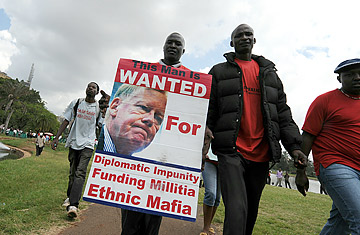
Protesters in Nairobi on Dec. 15, 2010, condemn U.S. Ambassador Michael Ranneberger's involvement in Kenyan affairs
Michael Ranneberger, the U.S. ambassador to Kenya, has never been one to worry about upsetting Kenyan politicians with his demands that they clean up corruption. Now, the people he has long criticized are biting back with demands that President Barack Obama send him home early. Ranneberger, who has spent about 20 years of his career focusing on Africa, is the subject of a censure motion in Parliament that accuses him of violating the nation's sovereignty and portraying its leaders in a "negative light." The motion is likely to be debated in the coming days and the lawmaker who introduced it, Silas Ruteere, believes it will pass. "He has gone out of his way to portray every leader in Kenya as corrupt," Ruteere tells TIME. "He has run out of ideas and makes the Kenya-America relationship not as cordial as it could be."
When Obama, whose father was born in Kenya, entered the White House, Kenyans hoped their country would join into a special relationship with the U.S. Since then, if anything, the U.S. has stepped up its criticism of Kenyan corruption, with Ranneberger — whose Twitter username is USAMB4REFORM — leading the way. The latest furor erupted in December, after WikiLeaks released a January 2010 cable in which the ambassador allegedly said that President Mwai Kibaki and Prime Minister Raila Odinga are among the political elite who "benefit from and support impunity and the lack of accountability," and that "no significant steps have been taken against high-level corruption, which remains rampant."
Ranneberger refuses to comment on the cables but acknowledges he has taken an "activist approach" to diplomacy. "There's no doubt that our strong push for reform and change has rattled the political establishment," he tells TIME. "[But] we're not seeking to impose any demands or any solutions. All we're seeking is to support the agenda of the Kenyan people to bring about real change."
Ranneberger is no stranger to the Kenyan government's ire. One of his most often used policies has been to deny visas for Kenyan leaders accused of corruption. In 2009, he announced that the U.S. government had sent letters to 15 prominent Kenyans to say that they were undermining reforms and wouldn't be allowed to travel to the U.S. unless they reversed their stance. That got him summoned by then Foreign Minister Moses Wetangula (who has since stepped down because of a corruption probe). Wetangula scolded Ranneberger for his "habitual breach of diplomatic protocol." "The visa bans carry enormous weight," Ranneberger says. "If you tell somebody you're banned from traveling to the United States, that is major."
But what really seems to irk the government is Ranneberger's habit of circumventing Kenya's political class and talking directly to ordinary citizens. Nothing better exemplifies his style than the U.S.-funded youth-empowerment programs that he helped set up. The $45 million Yes Youth Can! program cuts out the politicians and instead has Ranneberger meeting directly with young Kenyans. To the nation's politicians, who allegedly manipulated young people to protest — and sometimes kill — during the 2008 postelection violence, this is deeply threatening. Some in Parliament believe Ranneberger is using the programs to encourage Kenyan youth to overthrow their leaders, thus allowing the ambassador to install a President who will, as Ruteere puts it, "dance to his tune."
Ranneberger denies those claims and says he's trying to do just the opposite. "What these parliamentarians are really concerned about is that efforts to empower young people will potentially affect their ability to manipulate young people, which they've done for a long time," he says.
Even Kenyans with more moderate views than Ruteere's concede that sometimes Ranneberger's approach can come across as bullying. Yash Pal Ghai, a constitutional scholar and co-founder of a recent anticorruption campaign, harbors no love for Kenya's elite. "I have not met a single Kenyan member of the public who has anything good to say about politicians," he tells TIME. At the same time, however, he says Ranneberger can be a "lone ranger" who goes too far: "There is a real danger that this could backfire."
Some members of Parliament, however, think Ranneberger's brash brand of diplomacy is just what the country needs. Martha Karua, a lawmaker and former Justice Minister, was expelled from a recent session of Parliament for telling her colleagues that the ambassador's portrait of Kenyan corruption is accurate. "We must listen to even what we don't like," she said, going on to describe the Parliament as "the greatest auction house in Africa."
Ranneberger has no plans to tone it down as he winds up his term in Kenya. "What the U.S. is trying to do coincides closely with the interests of the Kenyan people," he says. "So while it's not a popularity contest, the approach that the U.S. has taken has clearly been well received by the majority of the Kenyan people."
Will Ranneberger's approach work? Whether related or not, Kenya has seen several high-profile corruption cases brought against senior officials in recent weeks, and the Kenya Anti-Corruption Commission has been newly revived.
Yet even Ranneberger himself is not sure the country is on the path to real change. "We will know real action is under way when somebody is brought to trial and, if he is convicted, sent to jail," he says. "I would say it's definitely too early to make a determination how significant this is in the overall war against impunity and corruption."
